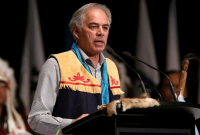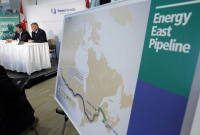Support strong Canadian climate journalism for 2025
The National Energy Board moved to calm the waters of Canada's pipeline debate as it laid the framework for its review of a major cross-country project called Energy East.
Calgary-based TransCanada Corp. has proposed to build the project, a 4,500 kilometre pipeline that would carry crude oil from the west all the way to New Brunswick. If built, the pipeline could carry 1.1-million barrels of crude from the prairies - including U.S. oil - to eastern Canada per day.
The review will include consultation with the general public, where they'll be allowed to question TransCanada directly during panel sessions held along the proposed route in Quebec, Ontario, and the prairie provinces. The panel hearings begin August 8 in Saint John, New Brunswick and federal Natural Resources Minister Jim Carr said he was encouraging Canadians to participate to inform the government's final decision on the project.
"Major resource projects must go through a review and consultation process that carries the public trust, and today marks a key milestone in that process," Carr said in a statement.
While the NEB was light on specifics, the pipeline regulator said the Energy East consultation process would be “one of the most innovative” hearings in its history.
“Details need to be worked out so we can hear from all Canadians who have relevant information about the project," NEB director responsible for reviewing the pipeline project, Jean-Denis Charlebois, said. "Details will be communicated when ready.”
The $15.7-billion project has been rocked with criticism from environmentalists and First Nations across the country. Just this week, the Assembly of First Nations of Quebec and Labrador announced that they were formally opposed to Energy East. They say the controversial pipeline poses severe "risk of a toxic tarsands spill that could not be adequately cleaned up," and will "fuel catastrophic climate change."
The new Liberal government in Ottawa has said major resource projects cannot go forward without better consultations with indigenous communities, but it has also maintained that First Nations do not hold a veto over development. During last fall's general election campaign, the federal Liberals had stressed that major industrial projects needed permission from local communities to proceed.
Charlebois said the regulator will collect “oral, traditional” evidence from First Nations during their three-phase consultation project.
“Aboriginal groups are always heard by the NEB when they file their views and evidence as part of the hearing record. To the extent that this group has done so, the panel will consider the information and store it as appropriate,” he said.
The NEB also said the hearings would allow participants to ask TransCanada officials questions about the project, reversing a controversial decision that the regulator made in its recent review of Kinder Morgan's Trans Mountain expansion proposal when it prevented anyone from conducting oral cross-examination of the company officials, instead requiring all questions to be submitted in writing.

Montreal-based NGO Équiterre denounced the NEB’s decision to start the hearings, saying that over 800 questions concerning the project remain unanswered. They want to know how the pipeline will cross the St. Lawrence and Ottawa rivers and are concerned about the 30 million tonnes of projected CO2 emissions, along with the potential threat to freshwater reserves in eastern Canada.
Équiterre Senior Director Steven Guilbeault said opposition to Energy East includes over 300 municipalities across Quebec, the Quebec Farmers Union, and over 170 local and grassroots organizations.
“The NEB is about to witness to magnitude of opposition to this project. We strongly believe that this project simply doesn’t pass the test of social acceptance,” Guilbeault said in a statement following the announcement.
Mayor of Montreal Denis Coderre, along with other Montreal-area mayors, slammed the Energy East proposal in January, saying the risk of spills is too high. Coderre caused a row between East and West, with prairie mayors and premiers criticizing his condemnation of the pipeline as naive. Calgary Mayor Naheed Nenshi called his assessment flat out “wrong,” adding that the project will modernize existing pipeline infrastructure.
Premiers across the country laud the proposed pipeline, lauding the economic benefits and its potential to wean Canada off foreign oil. The pipeline is expected to generate $55-billion for Canada.

Environment Canada is responsible for assessing upstream greenhouse gas emissions — those resulting from the extraction, processing, handling and transportation of oil and gas — during the review.
Charlebois said he “cannot speak to that” when asked about whether or not the NEB will consider the global commitment to limit temperature increase to below two degrees Celsius. He said the NEB’s job is to determine whether or not the Energy East pipeline is in the public’s best interest. He added that the review will be conducted rigorously with over “50 years of regulatory excellence.”
The assessment also includes the Eastern Mainline Project, a proposed 279 km gas pipeline from Markham, Ontario to Brouseville, Ontario. The NEB said Eastern Mainline would “enable TransCanada to continue to meet its commercial obligations should the Energy East pipeline be approved.”
Now that the National Energy Board determined TransCanada’s application is complete, it has up to 21 months to review the project. The NEB has to submit their report to the minister of natural resources by March 16, 2018.
-With files from The Canadian Press.







Comments
Charlebois stated, "that the review will be conducted rigorously with over “50 years of regulatory excellence.”". In whose opinion?
The Federal government finds the PUBLIC is credible, having lost confidence in the NEB and therefore plans to "modernize" the NEB. Internal NEB employment surveys have revealed questionable management and severe employee discontent.
THIS is regulatory excellence?